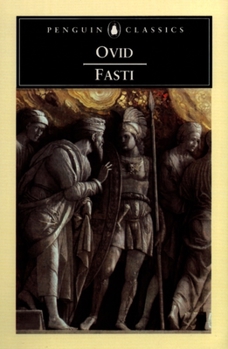Fasti
Select Format
Select Condition 
Book Overview
Written after he had been banished to the Black Sea city of Tomis by Emperor Augustus, the Fasti is Ovid's last major poetic work. Both a calendar of daily rituals and a witty sequence of stories recounted in a variety of styles, it weaves together tales of gods and citizens together to explore Rome's history, religious beliefs and traditions. It may also be read as a subtle but powerful political manifesto which derides Augustus' attempts to control his subjects by imposing his own mythology upon them- after celebrating the emperor as a Jupiter-on-earth, for example, Ovid deliberately juxtaposes a story showing the king of the gods as a savage rapist. Endlessly playful, this is also a work of integrity and courage, and a superb climax to the life of one of Rome's greatest writers.
Format:Paperback
Language:English
ISBN:0140446907
ISBN13:9780140446906
Release Date:January 1
Publisher:Penguin Classics
Length:432 Pages
Weight:0.68 lbs.
Dimensions:0.8" x 5.1" x 7.8"
Age Range:18 years and up
Grade Range:Postsecondary and higher
Customer Reviews
3 ratings
Very well done!
Published by Thriftbooks.com User , 17 years ago
This Penguin edition is very well done and preserves the meaning of the Latin without distorting or mangling it. The book also contains copious and well-researched notes to explain the numerous festivals, minor dieties, and individuals that Ovid mentions. The Fasti is invaluable as a glimpse of Roman culture, not only as a product of the Etruscan influences, but those of the other Italic peoples and the Greeks as well. Ovid skillfully adapts a plethora of "sacred rites unearthed from ancient annals" (1.7-8). What those "sacred annals" contained, we don't know for sure, but many of Ovid's stories included in the poem allude to and are corroborated by the works of Hesiod, Livy, Catullus, Lucretius, Vergil, and others. Ovid however puts his "slant" on things and makes associations that some argue are erroneous. Perhaps. But, taken as a whole, the Fasti is a great poem to also put Roman history into perspective. Ovid again and again stresses Rome's humble beginnings and it's current (for him) preeminence in the world -- "imperium sine fine." A very well done translation of an amazing work that is not widely read in schools.
wrong book
Published by Thriftbooks.com User , 20 years ago
The review posted above is for the Loeb edition of Ovid, which is very different from Fantham's edition.
Counting the days, at "the end of the world"...
Published by Thriftbooks.com User , 21 years ago
This one volume work in the Loeb Classical Series (# 253) isOvid's remarkable combining of poetry, myth, astrology,astronomy, and commentary on Rome. Apparently the work was written, or completed, whileOvid was in exile in what is today Romania (in theancient city of Tomis), having been sent there by theEmperor Augustus. Ovid's life there must have been misery, anguish, andhardship (how different from the famous poet allRome had talked about before his fall!). The poems about that exile, along with letters which he sent backto Rome, can be found in Loeb Classical volume, # 151, -Tristia, Ex Ponto- (ISBN: 0674991672). This present volume "is a poetical treatise on theRoman calendar, which it discusses in chronologicalorder, beginning with the first day of January andending with the last day of June, where it stopsabruptly." (Introduction.) Ovid had intended towrite 12 parts to the work, but we only have thefirst six. The author of the Introduction makes some scholarly speculations about what happened tothe other six parts, which are very interesting. This Loeb version is translated by James G. Frazer,who himself had orginally published a 5-volume editionof the -Fasti-, but trimmed a bit of his scholarlycommentary in order to produce this one-volume editionfor the Loeb series. Frazer (1854 - 1941) was aBritish anthropologist, folklorist, and classicalscholar; his 12 volume opus, -The Golden Bough-,is a world-famous work on comparative ancient religions,myth, and cultural rites. Ovid, himself, was exremely interested not onlyin poetry, but in myth and cultural rites as well. Thatis clearly evidenced in the -Fasti-. Here is an exampleof the combining of poetry, with myth, and astrology/astronomy from March 5: "When from her saffron cheeksTithonous' spouse shall have begun to shed the dew /at the time of the fifth morn, the constellation,whether it be the Bear-ward or the sluggard Bootes, will have sunk and will escape thy sight. But notso will the Grape-gatherer escape thee." There ismore to the quote which expands on the myth of theorigin of the constellation. There are excellentnotes to explain allusions, as well as a scholarlyIntroduction to the volume. Though Ovid was trying to find some way to gaineither commutation or release from his exile, he wasnot successful (either under Augustus or his successor,the Emperor Tiberius). Still, though seeking clemency,Ovid nonetheless takes satiric swipes at Rome'slosing of ancient values. Ovid died in exile andwas buried in Tomis. "Sic transit gloria mundi." -- Robert Kilgore.





